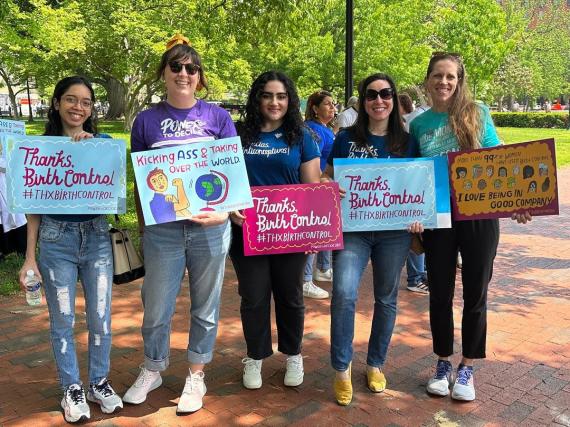Opening a Dialogue Around Emergency Contraception
When talking to young people, friends, and family about sex, love, and relationships, it’s also important to cover the full range of birth control methods and backup methods, including emergency contraception (EC). Doing so helps to normalize important conversations around EC and birth control more generally, in a way that empowers you and your loved ones to have open, honest communication around sexual and reproductive health and beyond.
We know that these talks can feel daunting, so we’ve compiled some of the most important reasons to talk, facts to use during your conversation, and a few ideas on how to get started. In May we highlight #TalkingIsPower. So don’t waste an opportunity to learn about emergency contraception for yourself and then start talking about it.
Why Talk About Emergency Contraception?
As with every conversation around sexual and reproductive health, there are a number of important and interrelated reasons to discuss EC. First, having information about all available birth control options, including backup options such as emergency contraception, can help people find a method that’s a good fit for them right now. Second, it’s incredibly important to normalize conversations around emergency contraception. A study in 2010 found that one in nine women who have had sex have used EC. Forty-nine percent of those who used EC reported that they did so because they had unprotected sex.
All information is power. Ensuring you, your partner, and those who mean the most to you are fully informed about all their options means that they’re more likely to make a decision that matches their intentions for their future. Plus, being open about all aspects of sex and sexual health now helps alleviates anxiety before anyone finds themselves in a situation where they need EC.
Finally, young people in particular are naturally curious; when they approach a parent or champion with their reproductive and sexual health questions it’s a sign that they feel comfortable and know that they can get answers from a trustworthy and judgment-free person. Though it may be daunting or scary to hear what they’re wondering about, asking for more information on sex or birth control does not always mean that they’re having sex or need EC right now (though they also might!).
The Facts Around Emergency Contraception
What is EC?
EC is a birth control backup that can be used after unprotected sex or birth control failure to help prevent a pregnancy before it starts. That means it’s not the same as an abortion. Anyone who has had unprotected or under-protected sex in the last five days and doesn’t want to get pregnant can take EC. There are a few types of EC—two pill options and two IUD options.
EC pill options
Over-the-counter (OTC) EC pills, such as Plan B One-Step® (Plan B) or generics, and prescription EC pills, brand name ella, both work by temporarily delaying ovulation (when your ovary releases an egg) to prevent sperm and eggs for meeting up to help prevent pregnancy. All EC pills work better when you take them ASAP – no need to wait for the morning after (or at all) – but they may work up to 5 days after unprotected sex. With both types of EC pills, you’ll need to take another dose of EC every time that you have unprotected sex to prevent pregnancy.
IUD options
A copper IUD (Paragard) and an IUD with 52mg of levonorgestrel (Liletta or Mirena) can both be placed up to five days after sex to help prevent pregnancy. These types of IUDs are nearly 100% effective when placed anytime up to five days after sex and you can continue using them as super effective birth control (or have them removed).
How can you get EC?
Find OTC EC pills at the pharmacy, online, at a clinic, or even in some vending machines! There are no age or gender restrictions on getting OTC EC pills like Plan B in any US state – they should be available right off the shelf at retailers across the country. However, there may be some unnecessary barriers to EC to watch out for.
To get prescription EC (ella), you’ll need to talk to a health care provider, either in person or online, first. Ella can be more effective than OTC EC pills, especially if it’s been longer since you had unprotected sex or have a higher body weight, but as a prescription is required for ella, access can be more challenging. Regardless, the most important thing to know about taking EC is that the sooner you take it the better it works!
IUDs are placed by a provider, so to use an IUD for EC you’ll need to see a provider in person. When calling to make an appointment, make sure they know it’s for EC so that you are scheduled quickly and can be sure to place the IUD the same day as your appointment.
If you need help finding EC pills (in person or online) or a provider to place an IUD for EC, check out Bedsider.org.
How to Start a Conversation
Now that you’re armed with the facts around EC, it’s time to start talking. But how?
Consider working emergency contraception into a larger discussion of birth control methods. Or perhaps pick some up the next time you’re at the pharmacy and use it to start a conversation. Remember, EC pills, especially over-the-counter Plan B and generic versions, are most effective when taken ASAP – and having them on hand can help with timing. Options such as Plan B also have a shelf life for around 4 years, so you’ll be covered for whenever you might need it.
If you’d like to talk specifically about emergency contraception with someone you think might be uncomfortable sitting down face-to-face, consider picking an article together, reading it, and afterwards discussing what you learned, what you have questions about, what surprised you, etc. Or, if you both have the facts down, pose a hypothetical situation about someone who needs EC and explore potential challenges that could come up together.
No matter how you approach talking about emergency contraception, sex, love, relationships, or any other conversation, remember that it’s ok not to have all of the answers. Be honest if you aren’t sure of an answer. You can come back to conversation later with research you’ve done on your own or look up resources together. What matters is letting those you love to know that you’re listening and open to talking. Because #TalkingIsPower and you’re more powerful than you think.



